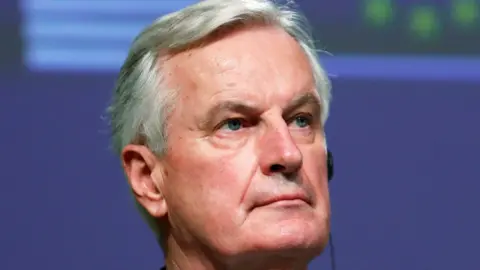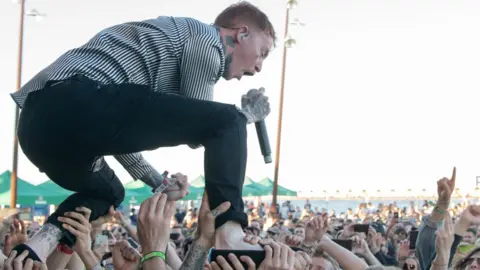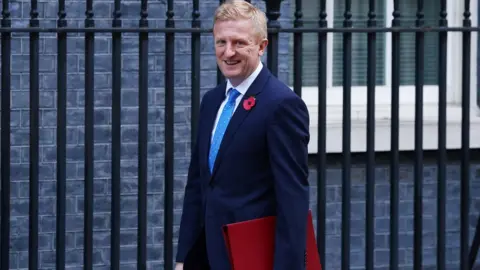EU blames UK after outcry over end to visa-free touring for musicians
 Reuters
ReutersThe EU has insisted it was the UK government's choice to end visa-free touring for musicians on the continent, following an outcry from performers.
Officials in Brussels told the BBC that the UK "refused" a plan that would have let musicians tour without visas.
The response came after Downing Street re-affirmed that its own "ambitious" proposals had been rejected by the EU.
The EU's Brexit negotiator Michel Barnier said the result was one of the "inevitable consequences" of Brexit.
"I very much regretted that the British didn't have more ambition for people's mobility," Mr Barnier told reporters on Thursday.
'You need two to make a deal'
"From last March, we made fairly ambitious proposals in terms of mobility, including for specific categories such as journalists, performers, musicians and others," he went on. "But you need to be two to make a deal."
Pressure has been mounting on the two sides to negotiate an exemption to the new restrictions for musicians, with performers and crews saying livelihoods could be at risk.
Since Brexit, British musicians and crews are no longer guaranteed visa-free travel and may need extra work permits to play in certain European countries.
Under the terms of the deal, British bands can tour Europe for up to 90 days in a 180-day period. But tours in Germany and Spain, for instance, will now require extra visas for paid work, while those in France and The Netherlands will not.
 Getty Images
Getty ImagesPopular European touring routes could now see them take on extra costs and paperwork. According to the Association of British Orchestras, truck drivers carrying stage equipment must now return to the UK after visiting two EU member states.
A petition signed by more than 250,000 people - including Laura Marling, Biffy Clyro and Dua Lipa - is calling on the the government to "negotiate a free cultural work permit" that would allow "bands, musicians, artists, TV and sports celebrities that tour the EU to perform shows and events and carnet exception for touring equipment".
The government later responded to the petition, saying the EU "turned down proposals", while noting that "there is scope to return to this in the future".
'Reciprocal agreement
On Thursday, Musicians' Union general secretary Horace Trubridge demanded greater support from Prime Minister Boris Johnson for UK artists hoping to tour in Europe again once it's safe to do so.
A "reciprocal agreement" for EU artists arriving into the UK would be "in the interests of the UK and EU", he said.
"Our industry has been incredibly badly hit by the Covid-19 crisis and if our members are also restricted by additional costs and red tape on touring once things start to go back to normal, we will see a real downturn in what is a unique British success story: Music."
Mr Johnson vowed on Wednesday during Prime Minister's Questions to meet MPs to discuss the matter. "I know that our friends in the EU will be wanting to go further to improve things for not just musicians, but business travellers of all kinds. There is a mutual benefit," he said.
What has the EU said?
An EU spokesperson told the BBC: "The UK has chosen to no longer allow the free movement of EU citizens to the UK. It also refused to include a chapter on mobility in the agreement.
"These choices inevitably mean that travel between the EU and the UK - including for business purposes - will no longer be as easy as it was while the UK was a member state."
He added that the UK "refused to include a commitment on visa-free short stays", which could have meant people like musicians, sportspeople and journalists would not have needed individual visas.
"As a result, it is now up to each member state to determine if a visa is required for short-stay visits for the purpose of carrying out a paid activity. This is fully in line with EU law."
The EU would not be drawn on whether it would re-open talks around music touring visas.
 Reuters
ReutersThe government has previously said it "pushed for a more ambitious agreement with the EU on the temporary movement of business travellers, which would have covered musicians and others, but our proposals were rejected by the EU".
On Tuesday, it added that "the door remains open should the EU change its mind".
Then on Wednesday, Culture Secretary Oliver Dowden blamed the EU for "letting down music on both sides of the Channel - not us".
Prof Catherine Barnard, deputy director of research organisation UK In A Changing Europe, told BBC News: "The bottom line is that the EU did offer up to 90 days, and with the possibility of being paid.
"I suspect the UK probably said no because they have a very hard line on anything that may even look like free movement of persons, which of course the UK had committed itself to stopping."

Follow us on Facebook, or on Twitter @BBCNewsEnts. If you have a story suggestion email [email protected]
